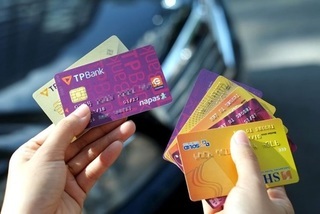Speaking at a forum on developing e-payment ecosystem development held in late 2019, Deputy Prime Minister Vu Duc Dam said the Party’s Politburo released a resolution on the 4.0 industry revolution. The government also released many instructions to grab the opportunities brought by the revolution.

Dam stressed that non-cash payment not only aims to increase capital rotation in society and transparency to fight money laundering, but also helps stimulate the internet economy. Vietnam has been slow in changing magnetic cards into chip cards and needs to step up the process.
Nguyen Dinh Thang, president of LienViet Post Bank, anticipated that banks will have to pay big money for the conversion plan. They will have to spend money on new technology, machines, POS system and terminal devices. Besides, it will take time to work with customers to replace cards.
Tran Cong Quynh Lan, deputy CEO of VietinBank, also said that the biggest challenge for banks is the high cost.
| Vietnam’s banks started replacing magnetic cards with chip cards some years ago, but the process has been going slowly. |
Banks will have to replace a series of machines and devices, while the cost for issuing chip cards is much higher than magnetic card.
However, Lan agrees that the conversion is a must and what banks need to do is turn challenge into opportunity. Chip cards can integrate and store information for customers and synchronize payment for many different services, such as transport, healthcare and education.
Vietnam only has two years to implement the conversion. Meanwhile, according to Dao Minh Tuan, chair of the Vietnam Bank Card Association, the conversion has been going very slowly with only 10 percent of bank cards having been replaced.
Under the roadmap set by the Circular No 41 dated December 28, 2018, Vietnam will complete the conversion of domestic cards to chip cards by December 31, 2021.
A question has been raised whether Vietnam would lag behind the world if it only can complete conversion after two years, while chip cars have been used popularly in the world for a long time and technology changes every day.
Tuan said it is true that technology changes rapidly, but chip card just provides a base for banks to develop many services.
“In the next two years, with the development of the chip platform, along with the added services on the chip system, banks will provide many other services, integrating many other utilities like health and education on bank cards,” Tuan said.
An analyst said that chip cards account for 90 percent in the world, but only 60 percent in Asia.
Thanh Lich

VN banks issues more chip cards for security
Despite high costs, domestic banks are issuing more chip cards that meet EMV standards to replace magnetic strip cards in order to improve security and meet the central bank’s regulations.
 Vietnam’s banks started replacing magnetic cards with chip cards some years ago, but the process has been going slowly.
Vietnam’s banks started replacing magnetic cards with chip cards some years ago, but the process has been going slowly.